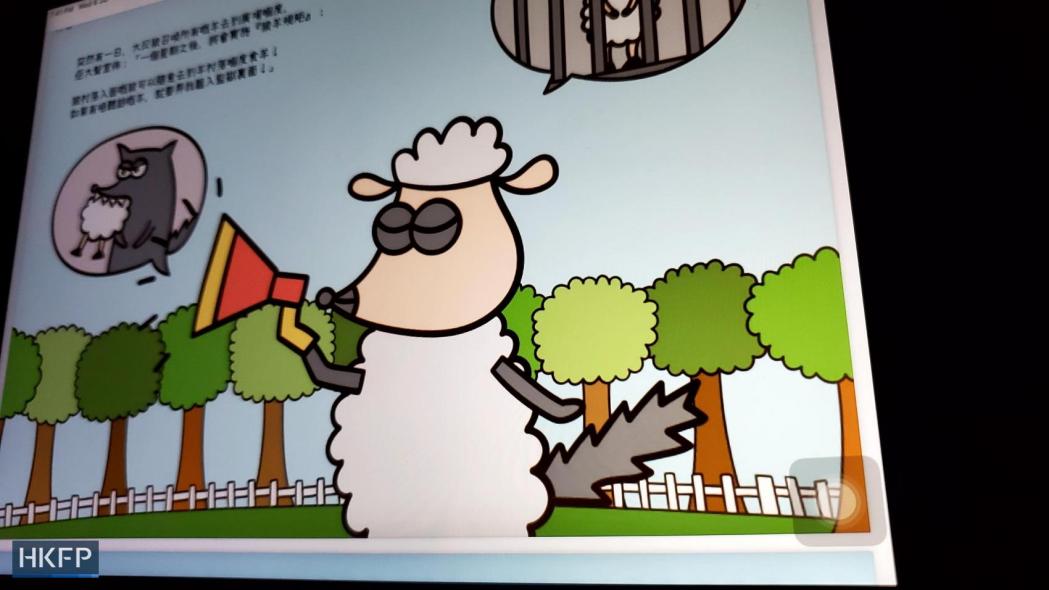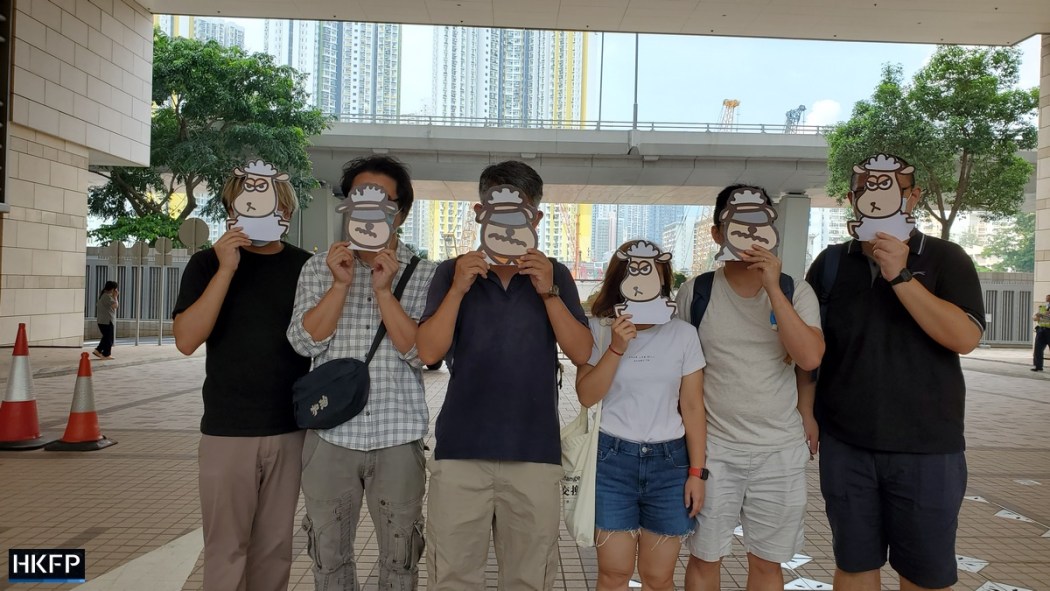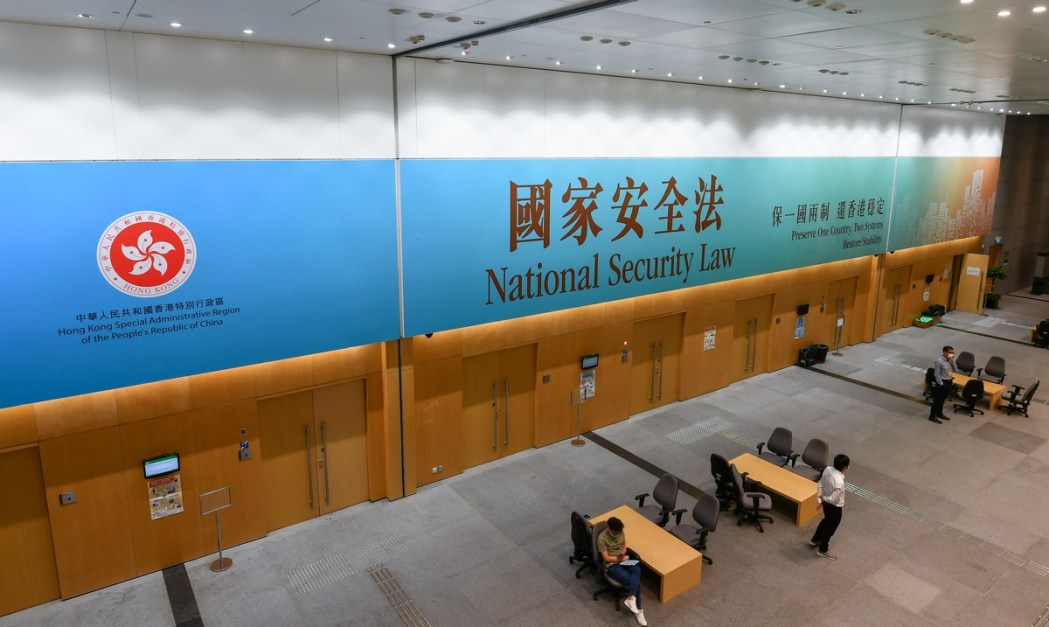Prosecutors in Hong Kong have played an animation and audio recording based on two children’s story books on the second day of a trial involving five speech therapists. The suspects allegedly conspired to promote separatism and incite hatred against the government by publishing a series of kids’ publications about sheep.

Speech therapists Lorie Lai, Melody Yeung, Sidney Ng, Samuel Chan and Fong Tsz-ho returned to the District Court on Wednesday for the second day of their trial under the colonial-era sedition law. The five executive committee members of the General Union of Hong Kong Speech Therapists stand accused of taking part in a conspiracy to print, publish, distribute or display three children’s picture books between June 4, 2020 and July 22 last year with seditious intention.
The prosecution argued on Monday that the books about sheep and wolves were alluding to 2019 extradition bill protests, the arrests and detention of 12 Hong Kong fugitives by the Chinese authorities, and a strike staged by Hong Kong medics at the start of the Covid-19 outbreak.
The books were said to have “indoctrinated” readers with separatism, incited “anti-Chinese sentiment,” “degraded” lawful arrests and prosecution and “intensified” Hong Kong-China conflicts.
Miniature statues
On Wednesday, prosecutors read out a long list of exhibits in the case and handed several items to District Judge Kwok Wai-kin, including three handheld boards found in Yeung’s home which featured the union’s name, social media handles and contact details. They also submitted 18 miniature statues donning protest gear, marked with the union’s name, as well as six pieces of paper which could be arranged to read: “Glory to Hong Kong.”
Lead prosecutor Laura Ng showed Kwok footage of media interviews that featured Lai, the union’s chairwoman and Yeung, who was the external vice-chief. The prosecution then played an animated version of the first picture book about “guardians of the sheep village” and an audio recording of the second book about the “12 warriors of the sheep village.”

People in the public gallery giggled as the video and audio were played in the courtroom, while the speech therapists in the sitting the dock smiled.
Multiple laptops and mobile devices were seized during the arrest operations on July 22 last year, Prosecutor Crystal Chan told the judge. She said they contained records of the union executive members contacting various pro-democracy shops and former district councillor Lam Chun to supply copies of the books in question for distribution.
The prosecution said police also uncovered 21 copies of a “reading guide” for the picture books at the residence of Chan, who was the union’s treasurer. The document told parents to “prompt” their children’s interest in the story, give responses to their children during story-telling, as well as ask their children to repeat lines after them.
The prosecution revealed that the union’s then-internal vice-chair Wong Hoi-ching, who was named in the alleged conspiracy, left Hong Kong a day before police apprehended the five defendants on July 22, 2021. She has not been charged.
Adjourned to July 18
Following the lunch break, the prosecution summoned the only witness in the case – a police officer surnamed Cheng – who told the court how he concluded that the picture books were referring to real-life events. The officer also said he found several audio-visual versions of the picture books online.

District Judge Kwok ruled that the evidence presented by the prosecution was sufficient to make a prima facie case against the defendants. The five speech therapists decided not to give testimony in court and not to summon any witnesses.
The court was set to proceed with hearing closing arguments, but the prosecution asked for an adjournment of one to two weeks for preparation. The request was opposed by all defence counsels, saying that such an arrangement would be unfair to the defendants who have been locked up for nearly one year pending trial, after they were denied bail on national security grounds.
The defence lawyers said their clients may end up spending more time in prison than their sentence, if convicted.
The court attendees, many of whom were family members and friends of the accused, also expressed discontent over the prosecution’s request. Some sarcastically asked why the case could not be adjourned to “next year,” while others asked whether the prosecution wanted the defendants to be detained “until they are 40 years old.”
“[The prosecution] just wanted to drag this on… [the defendants] are not their children anyway,” the father of one of the speech therapists uttered from the public gallery.

The court eventually adjourned the case to July 18 for the prosecution and defence to make verbal submissions, including debating on constitutional disputes. Both sides were required to submit written submissions to the court prior to the next hearing date.
Sedition is not covered by the Beijing-imposed national security law, which targets secession, subversion, collusion with foreign forces and terrorist acts and mandates up to life imprisonment. Those convicted under the sedition law, which was last amended in the 1970s when Hong Kong was still a British colony, face a less serious maximum penalty of two years in prison.
Support HKFP | Policies & Ethics | Error/typo? | Contact Us | Newsletter | Transparency & Annual Report | Apps
Help safeguard press freedom & keep HKFP free for all readers by supporting our team
























